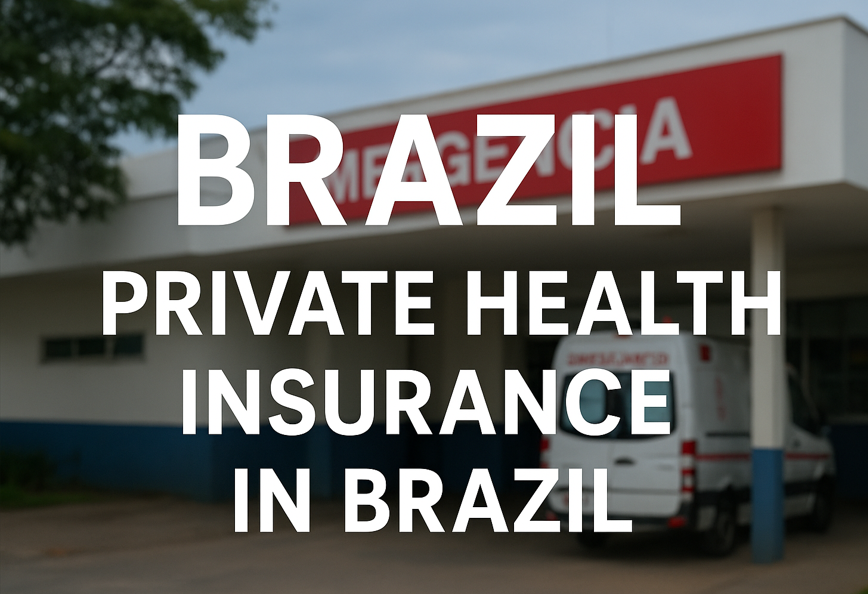Expats need private health insurance in Brazil. Let’s look into the aspect of getting health insurance that is privately offered to them. Find out the legal requirements, prices, who the best providers and reasons why most foreigners opt to engage in private coverage.
Introduction
There is a dual system of healthcare in Brazil, and all expats should be aware of it before moving in. A public healthcare system (SUS – Sistema Único de Saúde) gives free medical care to every citizen of the country, even a foreigner legally living in Brazil. Although this universal coverage is a beautiful-sounding theory, it has a lot of gaps that most expats soon find out about. Expensive, long queues, congested health facilities, differing quality beyond large cities, and language barriers make it almost vital that one takes private health insurance, especially for people who are used to receiving instant and quality health services.

Understanding of private health insurance
The situation in the area of healthcare is just the opposite in Brazil, as the safety and comfort of private medical institutions such as the Hospital Israelita Albert Einstein in São Paulo are on a par with the best in the Latin American region.
To expats in particular (and to those with families or existing medical conditions), a private plan offers essential benefits such as direct access to specialists, English-speaking physicians, state-of-the-art facilities, and excellent insurance coverage, which frequently covers dental and foreign evacuation.
This guide will consider every important aspect of expats need private health insurance in Brazil, including what the law requires of you or the cost, as well as the options available with different providers and how you can select them practically.
Healthcare System in Brazil: Private Vs Public
Let’s differentiate between the public and private healthcare systems of Brazil.
Pros and Cons of Public Healthcare (SUS)
SUS is one of the accomplishments that make Brazil stand out among several developing countries because the constitution of the country has ensured that every resident is entitled to free healthcare. The system includes:
- Simple healthcare, such as visits to doctors
- Public hospitals’ emergency care
- A government program provides some drugs
- Immunization and prevention.
But the expats are hit with several obstacles:
- Wait times that are excessively long (reaching 6+ months to get a specialist consultation)
- Congested institutions with few needs
- Rural inequality and the difference in quality between urban and rural areas
- There is a minimal number of English-speaking personnel in the majority of destinations
- Advanced care low coverage
About Private Healthcare – Why expats need private health insurance in Brazil
The private healthcare covers all the SUS deficiencies, including several additional advantages:
- Quick access to diagnostic tests and specialists
- Top-notch medical facilities that meet Western standards
- Staff and physicians who speak English
- Cozy private spaces with contemporary conveniences
- Complete coverage that includes vision and dental care
- International acclaim for medical evacuation
Legal Requirements for Expats
Brazilian health insurance requirements differ by visa type:
Work Visa Holders:
- Employers are required to provide health insurance (Brazilian labor law mandate)
- Coverage must meet the NHA (National Health Agency) minimum standards
- Generally, includes hospital, emergency, and outpatient services
Permanent Residents:
- No legal requirement for insurance
- Highly recommended due to limitations of SUS
- Commonly required by private schools for children to attend
Retirees and Digital Nomads:
- Not legally required, but effectively necessary
- Certain categories of visas require insurance proof
- Critical for the pre-existing
Tourists and Short-Term Travelers:
- Travel insurance is strongly recommended
- Some credit cards offer some coverage
- Public hospitals will handle emergencies anyway
- Private Health Insurance Cost
Cost of Health Insurance
Pricing Drivers:
- Age (50+ experiences huge cost increases.
- Coverage amount (basic to high-end international)
- Geographic location (São Paulo is the most costly)
- Pre-existing conditions (usually excluded at first)
- Deductibles and co-pay (lower-cost options available)
Average Monthly Premiums:
- Basic Plans: $50-$150 (only covers the basics)
- Mid-Range Plans: $150-$300 (good hospital coverage)
- Premium Plans: $300-$600+ (international coverage included)
- Family Plans: Usually 2-3x times individual rates
Top Health Insurance Providers
Domestic Brazilian Providers:
- Amil – The Largest with the largest network
- SulAmérica – Nice mid-range choices
- Bradesco Saúde – Solid nationwide coverage
- Unimed – Cooperative with regional differences

International Providers:
- Allianz Worldwide Care – Global options available
- Cigna Global – Flexible expat plans
- AXA PPP – Full international coverage
How to Select the Right Plan:
Key Considerations
- Hospital network close to your residence
- Pre-existing condition coverage (usually 24-month wait)
- Emergency evacuation inclusion
- English-language support availability
- Claim process simplicity
Red Flags to Avoid
- Plans not covering chronic conditions
- Small hospital networks
- Overly burdensome claim documentation
- Reputation for poor customer service
FAQs On Health Insurance in Brazil
1. Can I use my home country insurance in Brazil?
Most policies are good for short visits, but don’t have local provider networks. Long-term expats require local coverage.
2. How does insurance cover pre-existing conditions?
Most have 24-month waiting periods. Some premium policies have late coverage for a higher fee.
3. Are dental and vision covered?
Typically added as options. Basic plans usually exclude them.
4. What is the claims process?
Most private hospitals charge insurers directly. Save all receipts for claims of reimbursement.
5. Can I switch providers easily?
Yes, but pre-existing condition coverage can reset waiting periods.
Conclusion: expats need private health insurance in Brazil
Getting around the Brazilian healthcare system takes some planning, particularly for expats who are used to different standards. Although the public SUS system has a safety net, its shortcomings render private health insurance a sound investment for most foreigners. The sense of security that you can receive quality care with ease, in your chosen language, and at well-equipped facilities justifies the reasonable expense for nearly all long-term residents.
When choosing insurance, look for plans with excellent hospital networks in your region, transparent terms of coverage, and attentive customer support. Most expats find the middle-tier Brazilian providers to be of the best value, while those who travel often might prefer international providers.
Whatever the decision, getting proper coverage in advance guarantees that you can be a full participant in the rich culture of Brazil without worrying about access to healthcare. Having the right insurance coverage, you’ll have one less thing to worry about as you head off on your Brazilian adventure.


